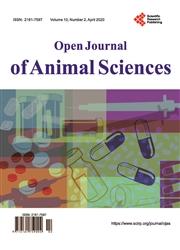Effect of Natural Feed Supplement on Methane Mitigation Potential and Performance in Holstein Bull Calves
引用次数: 1
Abstract
Introduction of solid feeds in the ration of calves has been shown to increase rumen size and stimulate rumen fermentation. With the initiation of bacterial fermentation in the rumen, the intermediary metabolism moves from a glucose-based to a volatile fatty acid-based metabolism, which releases methane. Mootral has been identified as a promising plant-derived feed supplement to reduce methane emission in dairy and beef cattle. Therefore, the present study aimed at quantifying and mitigating the methane emissions in calves until the slaughtering age of 28 weeks. The study consisted of 20 Holstein bull calves at a commercial farm, assigned randomly into 2 groups (control n = 10; treatment n = 10), for 2 weeks of adaptation and 8 weeks of sample collection. The calves were fed an increasing amount of milk replacer and ad libitum wheat straw. Mootral was fed once a day to the treatment calves. Methane was measured using GreenFeed units where concentrate feed was offered as bait. The calves were weighed at the start and every four weeks during the experiment. The calves in the treatment group had lower methane emissions (54 g/d) compared to the control group (70 g/d), a reduction of 22.8%. In contrast, carbon dioxide emission and dry matter intake did not differ significantly between the study groups. Moreover, no negative impact on the average daily weight gain and carcass weight was observed in Mootral fed calves. Although the methane emission (g/kg body weight) was lower in treatment than in the control group, the absolute difference between the groups narrowed with increasing age of the calves. The results suggest a need to increase the dose in line with the increased body weight and intake of the calves. In conclusion, Mootral effectively reduced methane in calves. Further trials to determine the optimal dose for calves are warranted, and as well studies to investigate if interventions (such as Mootral) applied at an earlier life cycle stage would have an impact on methane emissions at later stages of catHow to cite this paper: Brand, T., Miller, M. and Kand, D. (2021) Effect of Natural Feed Supplement on Methane Mitigation Potential and Performance in Holstein Bull Calves. Open Journal of Animal Sciences, 11, 222-230. https://doi.org/10.4236/ojas.2021.112017 Received: January 22, 2021 Accepted: April 17, 2021 Published: April 20, 2021 Copyright © 2021 by author(s) and Scientific Research Publishing Inc. This work is licensed under the Creative Commons Attribution International License (CC BY 4.0). http://creativecommons.org/licenses/by/4.0/ Open Access天然饲料补充对荷斯坦公牛犊牛甲烷减排潜力和生产性能的影响
在犊牛日粮中添加固体饲料可增加瘤胃大小,促进瘤胃发酵。随着瘤胃细菌发酵的开始,中间代谢从以葡萄糖为基础的代谢转变为以挥发性脂肪酸为基础的代谢,并释放甲烷。Mootral已被确定为一种有前途的植物源性饲料补充剂,以减少奶牛和肉牛的甲烷排放。因此,本研究旨在量化和减轻犊牛在屠宰28周龄之前的甲烷排放。本研究选用某商业农场的20头荷斯坦公牛,随机分为2组(对照n = 10;处理n = 10),适应2周,采样8周。犊牛逐渐添加代乳剂和随意添加麦秸。motral每天喂给实验组小牛一次。甲烷是用GreenFeed装置测量的,其中提供浓缩饲料作为诱饵。犊牛在试验开始时和试验期间每四周称重一次。与对照组(70克/天)相比,实验组小牛的甲烷排放量(54克/天)减少了22.8%。相比之下,二氧化碳排放量和干物质摄入量在研究组之间没有显著差异。此外,对月饲犊牛的平均日增重和胴体重没有负面影响。虽然处理组的甲烷排放量(g/kg体重)低于对照组,但随着犊牛年龄的增加,两组之间的绝对差异逐渐缩小。结果表明,需要根据犊牛体重和摄入量的增加来增加剂量。综上所述,motral有效地减少了犊牛体内的甲烷含量。有必要进行进一步的试验,以确定犊牛的最佳剂量,并进行研究,以调查在生命周期早期阶段应用的干预措施(如motral)是否会对后期的甲烷排放产生影响。引用这篇论文:Brand, T., Miller, M. and and, D.(2021)天然饲料补充对荷斯坦公牛犊牛甲烷减排潜力和生产性能的影响。动物科学学报,11,222-230。https://doi.org/10.4236/ojas.2021.112017收稿日期:2021年1月22日收稿日期:2021年4月17日出版日期:2021年4月20日版权所有©作者与科研出版公司。本作品采用知识共享署名国际许可协议(CC BY 4.0)。http://creativecommons.org/licenses/by/4.0/开放获取
本文章由计算机程序翻译,如有差异,请以英文原文为准。
求助全文
约1分钟内获得全文
求助全文

 求助内容:
求助内容: 应助结果提醒方式:
应助结果提醒方式:


